Kitchen to Market
90 Women Transform Their Lives Through SEE-Based Food Processing in Prakasam District
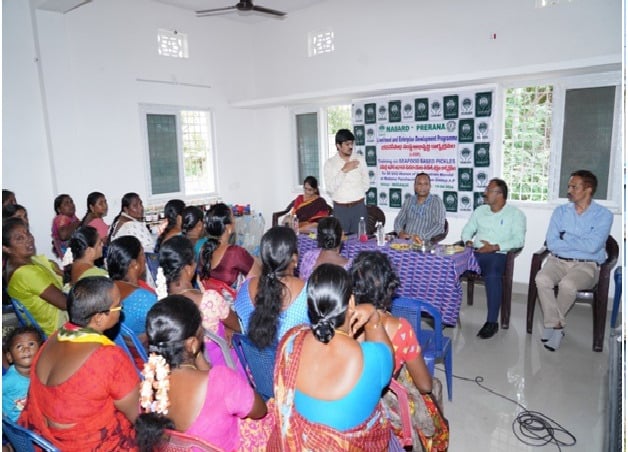

In the small coastal hamlets of Madanuru and Ethamukkala villages, nestled in Kothapatnam Mandal of Prakasam District, Andhra Pradesh, the lives of many women had long followed a predictable pattern marked by seasonal labor, uncertain incomes, and limited opportunities for self-reliance. To break this cycle and empower these women socially and economically, a livelihood project supported by NABARD was initiated. This project aims to uplift women by providing skill training, sustainable income sources, and pathways to economic independence, fostering hope and transformation in these traditionally underserved communities.
But in early 2024, change began to stir—not in the form of charity, but in the form of skill, vision, and solidarity. What began as a 45-day Livelihood and Enterprise Development Programme (LEDP) has now evolved into a quiet but powerful transformation—one that turned 90 women from mature Self-Help Groups (SHGs) into confident, skilled micro-entrepreneurs.
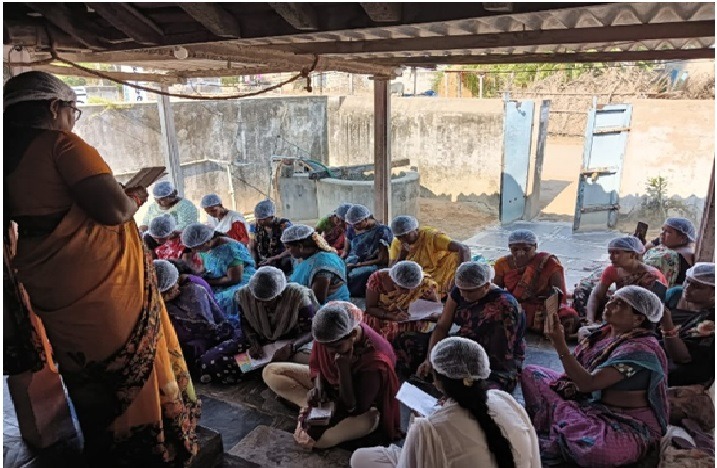

The Intervention: Skill Training with Purpose and Vision
Through door-to-door visits, community surveys, and SHG meetings, 90 willing and motivated women were identified. A central training demo unit was established in Madanuru village, where women were trained in three batches on value-added fish products—including fish pickles, prawn pickles, dried fish, and fish chili powder.But this was no ordinary cooking session.
The training was designed to be commercially focused, with modules on hygiene, packaging, branding, market linkage, and small business management. It provided the women not just with culinary skills, but with the confidence to start, sustain, and scale their own ventures.
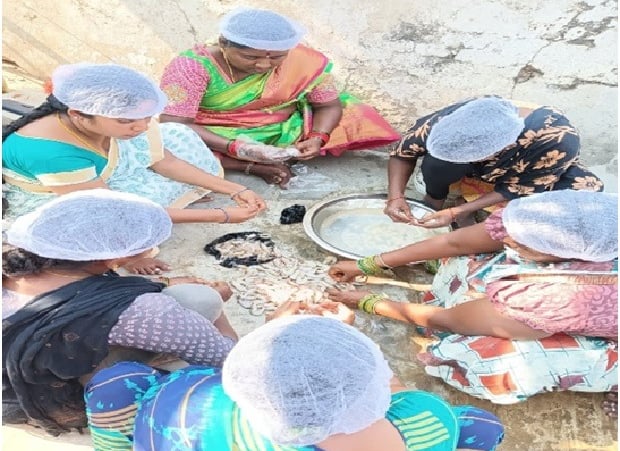

The Challenge: Cycles of Low and Seasonal Wages
Most women in these communities belonged to marginalized SC, ST, and BC communities, aged between 25 and 45, and were locked into cycles of low-wage seasonal work. Despite being active SHG members, their income potential remained untapped, and few had access to reliable livelihoods.
“We had dreams, but no direction,” says Malathi, an SHG member from Madanuru. “We used to wait for harvest seasons or small labor work. We never imagined that our kitchens could become our workshops.”
Outcomes: Earnings, Confidence, and Community Recognition
Out of the 90 women trained, 68 to 80 have already launched home-based or small-scale businesses, preparing and selling their products locally and regionally. For many, this is the first time in their lives they’ve earned money independently.
Before training:
Many women had zero personal income
Others earned between ₹3,000–₹6,000 per month
After training:
Monthly incomes wary from to₹6,000–₹20,000
A few exceptional women now earn over ₹30,000 per month
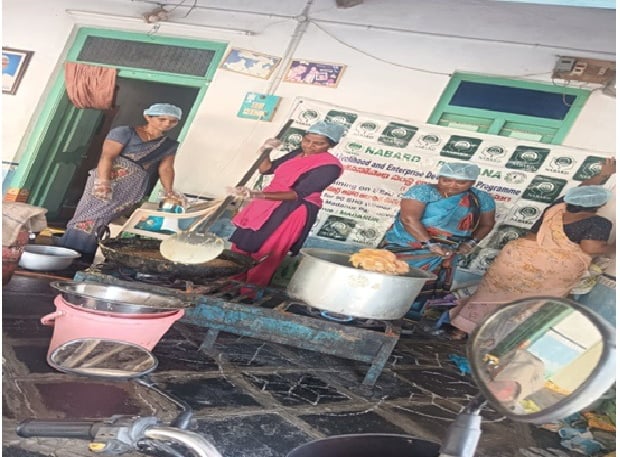

Location: Madanuru & Ethamukkala Villages, Kothapatnam Mandal, Prakasam District, Andhra Pradesh
Support Beyond Training: Handholding and Market Linkages
Project Support Components:
Toolkits and Production Support:
Provision of essential toolkits and materials to enable women to start and sustain their food processing businesses effectively.Handholding Support for Bank Linkages:
Assistance in connecting women entrepreneurs with banks to facilitate access to credit, enabling them to invest and grow their enterprises.Post-Training Business Handholding:
Ongoing support after training completion, including refresher sessions to reinforce skills and troubleshoot challenges in running their businesses.Establishment of District-Level Marketing Outlet at Ongole:
Creation of a dedicated marketing outlet to provide a direct sales platform for products made by women, enhancing visibility and profitability.
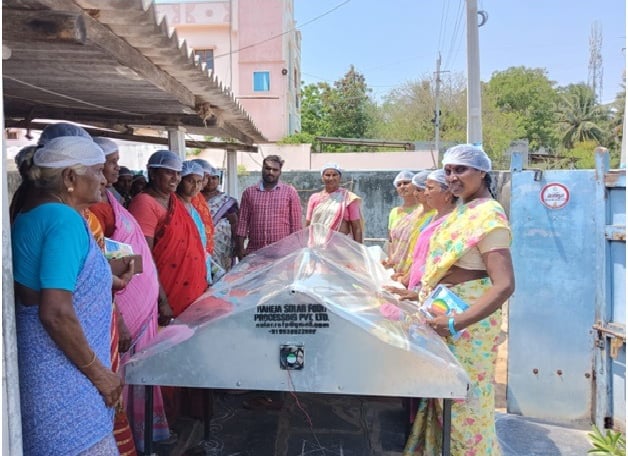

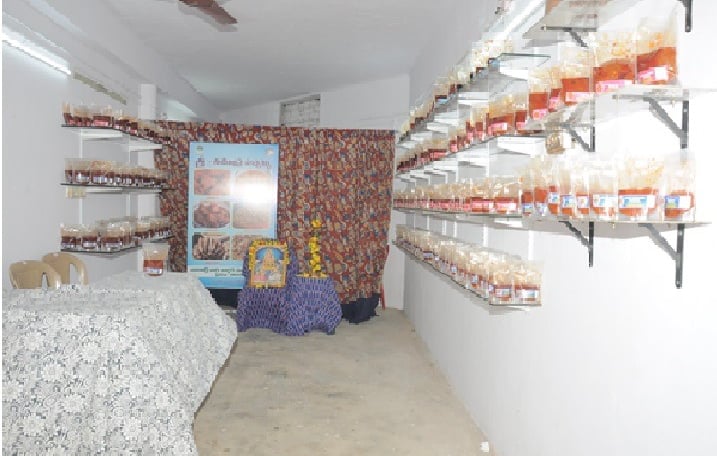

A Ripple Effect in the Community
With steady incomes, many of these women are now contributing to household expenses, investing in their children’s education, and even mentoring other women in their villages. The perception of women’s roles has shifted in the community.
“Earlier, I never left the house except for SHG meetings,” says In the quiet coastal stretch of Madanuru and Ethamukkala villages in Kothapatnam Mandal, Prakasam District, Andhra Pradesh, a silent revolution is underway. Ninety women, aged between 25 to 45 and mostly from marginalized SC, ST, BC, and general categories, have turned the tide on poverty through an innovative skill training programme on fish-based value addition.
These women, active members of self-help groups (SHGs), were selected through careful surveys, home visits, and community meetings. Many of them relied on seasonal, low-paying jobs and were looking for a sustainable source of income closer to home.
The Turning Point
Under the Livelihood and Enterprise Development Programme (LEDP), a 45-day hands-on training was conducted at a demo unit set up in Madanuru village. The training covered preparation of fish pickles, dried fish, prawn pickles, and fish chilly powder, equipping women with commercial-level food processing skills. The programme went beyond teaching recipes—it empowered women to recognize market opportunities, develop business plans, and link with banks and marketing platforms. 13 women received 35% subsidized loans, and many others applied for financial support to start home-based ventures.
To enhance the skills of the women entrepreneurs and improve product quality, a two-day refresher training on Moringa (Munga) Curry leaf, Dhaniya powder, Coconut powder, Allam Pickle, and other local curry powder preparation was conducted. This training focused on, standardizing recipes, to help the participants produce high-quality curry powders that meet market demands. The sessions also included practical demonstrations, troubleshooting common challenges, and guidance on maintaining hygiene and shelf life. This refresher course empowered the women to diversify their product range and boost their confidence in managing and marketing their curry powder products effectively.
From Trainees to Entrepreneurs
Today, 68 to 70 women out of the trained 90 have launched their own businesses, preparing and selling products from their homes or through a district-level outlet. Monthly incomes now range from ₹6,000 to ₹23,000, and in some standout cases, even higher.
One such example is Smt. Saritha, who started with zero income. Through dedication and by promoting her products via Instagram, Facebook, and WhatsApp, she now earns over ₹23,000 per month. In addition to traditional sales channels, many women entrepreneurs have embraced digital platforms like WhatsApp, Instagram, and Facebook to market and sell their products. Leveraging these social media and messaging tools, they connect directly with customers beyond their immediate communities, showcasing their homemade pickles and other food products to a wider audience. This digital presence has not only increased their sales but also helped build a loyal customer base through personalized communication and quick order processing. By harnessing technology, these women are overcoming geographical barriers, enhancing their business visibility, and gaining confidence in managing online marketing — marking a significant step towards modern, sustainable entrepreneurship.
A New Wave of Confidence
With steady incomes and rising demand, these women no longer need to depend on seasonal wage labour. The training has given them not just a livelihood, but confidence, dignity, and a voice in their households and communities. This initiative stands as a shining example of how targeted skill training and proper support can transform rural women into self-reliant entrepreneurs, driving change one household at a time. another trainee. “Now, people call me ‘Business Amma’ when I walk to the outlet.” The district-level outlet, by name “Sthree – Samudra Pickles“ managed collectively, has also become a hub for orders, community awareness, and future scale-up plans.
What This Success Means :Thisprogramme shows that with the right skills, institutional support, and community engagement, even the most economically vulnerable women can achieve economic independence and social dignity. It is not just a story of 90 women,it is a story of 90 families, multiple communities, and a rural economy in transition.
Looking Ahead
The model is now being looked at for replication across other coastal villages. The goal is to establish a sustainable value chain of women-led enterprises built on local resources and traditional knowledge, empowered with modern skills and market access.
“This is not just fish or prawn pickle it’s a symbol of dignity, independence, and self-worth,” says the lead trainer, proudly.
In the quiet coastal stretch of Madanuru and Ethamukkala villages in Kothapatnam Mandal, Prakasam District, Andhra Pradesh, a silent revolution is underway. Ninety women, aged between 25 to 45 and mostly from marginalized SC, ST, BC, and general categories, have turned the tide on poverty through an innovative skill training programme on See-based value addition. These women, active members of self-help groups (SHGs), were selected through careful surveys, home visits, and community meetings. Many of them relied on seasonal, low-paying jobs and were looking for a sustainable source of income closer to home.
Sthree Samudra Pickle Outlet: “An Ocean of Strength and Opportunity for Women”
As part of the LEDP project and with the support of NABARD, an exclusive outlet named Sthree - Samudra Pickle has been established at the district headquarters. This outlet is dedicated to providing a marketing platform for the women trained under the LEDP program to sell their homemade pickle products. The outlet is managed by a designated in-charge who oversees day-to-day operations and helps coordinate orders from customers. This arrangement has enabled the women entrepreneurs to not only sell their products directly but also receive orders from customers who often recommend the pickles to their friends and family, thus expanding their market reach.
The outlet has significantly boosted the women’s confidence and business skills, proving to be very profitable. On average, daily business at the outlet ranges between Rs.5,000 to Rs.10,000. Importantly, the women earn around 35% profit from sales made through the outlet, in addition to their regular business conducted from home, villages, and through digital platforms like WhatsApp and Facebook. This initiative has played a crucial role in enhancing the livelihood of the women by providing them with a reliable sales channel, increasing their income.
Sthree - Samudra Pickles
PRERANA
Igniting Development - Inspiring Change
Change
Impact
contact@prerana.org
+91 99897 26199
GATLAPSOLUTIONS © 2025. All rights reserved.
